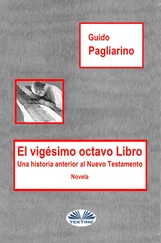My pilgrimage on my knees around the Judge’s house did not end in a miracle. I found no dead or unconscious bodies. The kitchen was as clean as an operating room, with no traces of the cooking of the day before, not even a faint smell. The garbage cans must have been washed and disinfected before new bags were put in. The refrigerator, gleaming and freshly defrosted, contained a modest amount of new, strategically chosen staples (eggs, milk, butter, my tofu, hot dogs, tomatoes, lettuce). No cooked food. The freezer was packed with the meats McCabe consumed. Judging from the even layer of frost on the top, it had not been disturbed recently. Whatever McCabe, Petrona, and Mrs. Crandall had cooked the day before (and I was sure it was not last night’s Rabelaisian dinner, which bore Petrona’s lone imprint) had disappeared, and no forensic analysis could reconstruct it. They had literally erased their fingerprints from every surface. The bulky shape wrapped in Mrs. Crandall’s blanket could have been a very large turkey, or a small pig, although the latter was doubtful even as speculation, given that Mrs. Crandall was not, even remotely, a spic. The living room was equally spotless.
At the end of the pilgrimage, after walking two, ten, twenty miles on their knees, the devotees of Saint Lazarus must climb the steep staircase leading to his shrine, still on their knees. It is only if and when they reach it that supplicants may beg the saint for a miracle. The gray stone steps have turned pink and shiny from the blood of a hundred thousand ulcerated knees. I went up the twenty-seven steps to McCabe’s room, one knee first, then the other, fifty-four times in total, unable to decide what miracle I would ask for: McCabe ill or sleeping, dead or unconscious, or in perfect and oblivious health, counting her money, signing her sale contracts, looking at the package of Joseph Beuys slides that her German agent had sent her on Monday, which she was carrying when she brought my breakfast, not knowing that I can read upside down at lightning speed. Anything, anything, anything but gone. Arriving at the landing before her door, I paused like all supplicants must when they reach the top, and their mouths are level with the rotting feet of the saint, being licked by his mangy dog. You lick the saint’s feet then, careful not to touch the dog, until he gives you what you want, or before the next sad biped piece of meat in line behind you elbows you away. McCabe’s door was locked. I looked through the generous keyhole, an 1820 Cutler Brothers model installed when the house was built, the Judge told me. There was no one inside the bedroom, or in the bathroom, or the closet, whose doors had been helpfully left open. There was nothing on any surface, anywhere: no FedEx packages, books, magazines, candy wrappers, no signs of human occupation. That did not mean the massive oak armoire was empty, or the chest of drawers, two night tables, bureau, medicine cabinet. I had never seen this, or any other McCabe habitat before, so I could not tell if this was the way this room normally looked, or if it had been especially cleansed like the rest of the house, as if State Security was expected any moment. The room exuded a jasmine fragrance. I stuck my nose to the keyhole and inhaled. My stomach rumbled at the memory of last night’s delicate rice. I descended the stairs on my ass. The house was empty. McCabe had flown the coop.
When Serafina was twelve, her mother, who had lost half of her nose and one ear to syphilis and was waiting to die, told her that her real father was not the man who had been killed in a knife fight when she was seven, nor any of the men who had been in and out of their shack ever since, but the most beautiful man that human eyes had ever seen—white, young, golden-haired, tall, strong, sweet, smart, generous, rich, well-spoken. Jacinto Benavides, the love of her life. She had reached that conclusion after repeatedly reliving their drunken, fornicating week together, which the man that she now thought of as the Beast had put an end to. She told Serafina how Jacinto was killed and dumped in the bay, but not by whom, and how his body had been found a week later by a fisherman, intact, as if he were just sleeping. Jacinto Benavides was then burned and his ashes strewn in the sea, as was done with men like him. Serafina asked what kind of men, but her mother could only tell her that it had to do with some quarrel among Spaniards. “What was this quarrel about?” Serafina asked, with a premature tinge of the sarcasm that would later serve her well. She had been raised in the certainty that Spaniards were quarrelsome, greedy, and stupid. “It was about their dicks,” her mother said, in a spasm of laughter so violent and prolonged that she almost died then, and not the next morning. When she recovered, she explained that some Spaniards like Jacinto Benavides cut the skin off the tips of their dicks. Most don’t, maybe because they are afraid of pain. They must be jealous of the brave ones, because they have gotten the King of Spain to forbid any dick trimming, and to punish those like Jacinto Benavides who dare to do it. Her mother advised Serafina to keep this information to herself. The less anyone knows about you, the safer you are, as her own mother had told her after revealing why she had been freed. Both of these things were family secrets. Serafina was now their keeper. Her mother made her swear on the Blessed Virgin, and on the holy wounds of Saint Glykeria, Martyr that she would pass on those secrets to one of her children, the smartest one. “Unless you only have one child, like me, in which case you better pray you’re as lucky as I’ve been.” This was the first and only time her mother praised Serafina out loud, although she did so to herself every day. She was afraid Serafina would become too vain for her own good. “Children talk too much. Only one of them should know. Don’t tell them all, and don’t tell too soon,” she added, before a gale of coughing carried her away. Serafina went to bed that night with a picture of her father in her mind. He looked just like her, fully grown and in men’s clothing. It was not too far off the mark. Serafina was the spitting image of Jacinto Benavides.
Serafina buried her mother near the back wall of the cemetery in the narrow, humid strip reserved for free blacks and mulattoes. Syphilis kills slowly, and her mother was hardworking and thrifty. She finished paying for her burial plot two years before taking up residence there. “I have room for two more,” she told Serafina. “Just don’t put them on top of me. I want to smell the grass.” The burial was swift. The mule-wagon man and his son slid the featherweight coffin into the hole. The gravedigger, who was three times as old as most of those he buried, mumbled a prayer as he began shoveling dirt into the hole. When he finished packing it with the back of his shovel, he looked at Serafina expectantly. So did the other two. She had no intention of giving them a tip after they had extorted from her an exorbitant fee in advance, knowing that she had no brother or husband to fight for her. She dismissed them, politely but firmly. They did not move at first. The old man clutched his shovel until his black knuckles became gray. The mule-wagon man spat and glanced at his son, who always knew what to do in cases like this. The son was distracted by the question of Serafina’s age. He could always tell by the shape of the breasts, but the coarse vest that covered Serafina’s upset his calculation. She was lucky to be wearing that vest, to be as tall as him, and a head above the two other men, and to look older and stronger than her age. Burying free blacks and mulattoes was unprofitable. You scraped a living only by periodically ransacking a shack while the relatives moaned at the cemetery, or snatching the rare gold chain or ring from the few corpses stupid enough to wear them. The most profitable side-business, however, was snatching the widow, if she was still young, along with the youngest orphans, and selling them to the illegal slave traders, mostly Dutch or French, who were always loitering in the twisted port streets. The mule-wagon man looked at Serafina’s long blond curls and light honey skin and knew he could never sell her as a slave. She was worth a great deal, but only to herself, if she was smart enough.
Читать дальше












